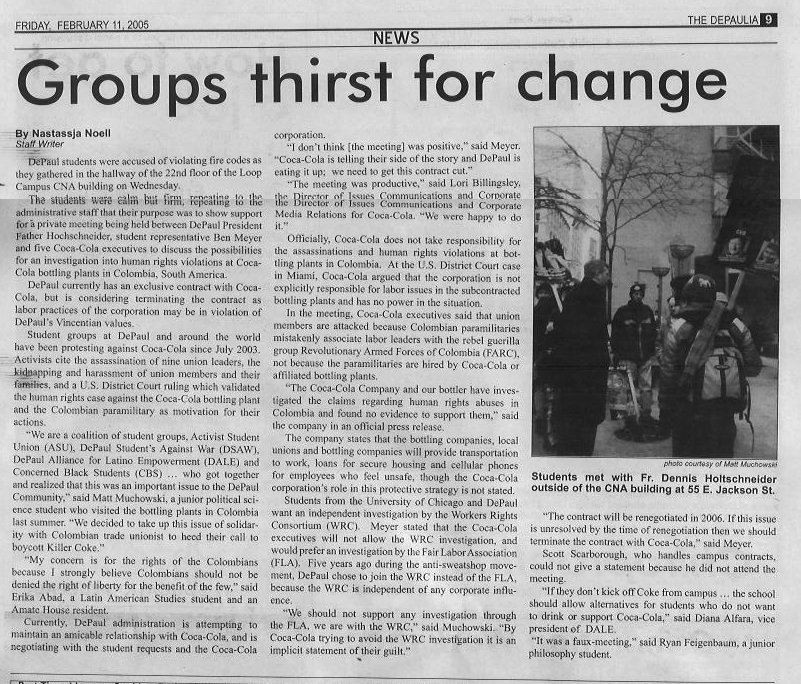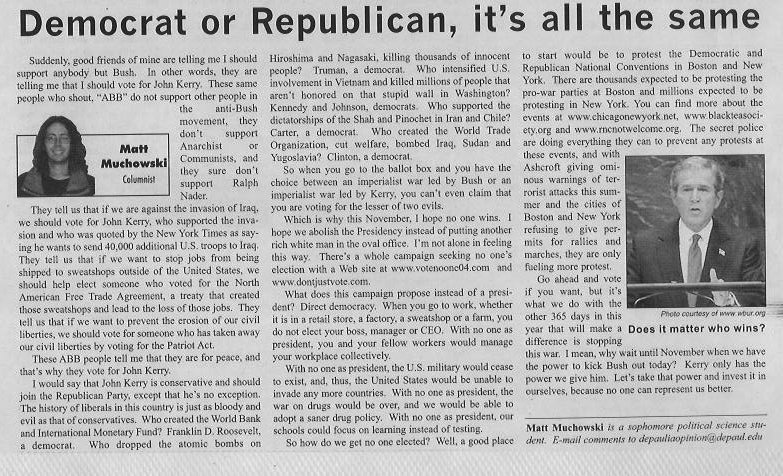Student Government has more power at DePaul than many would like to admit. It appoints students to funding boards like SAF-B and liaisons with many sectors in the University. But the most powerful aspect of Student Government is vested in the President who is the only student allowed to attend board of trustees meetings. It is at these meetings that the major financial decisions of the University are made. They deal with everything from the price of tuition, to contracts with unethical corporations, and much more.
Alejandro Acierto is my kind of guy. I met him at an anti-war protest in downtown Chicago. I would often find myself running into him at anti-war protests, without me even telling him about them. The best was when I was in New York City heckling some republican delegates from the GOP convention at a bar they were drinking at. Several dozen people gathered outside the bar to shout obscenities at the murderers of Iraqi and Afghani people when I realized that Acierto was one of the people besides me. Acierto is a music major of mixed Philippine and Mexican descent, former Music School Senator for Student Government and a sweet guy.
I met Cyndi Torres through her involvement in DePaul Students Against the War. Torres also became heavily involved in DePaul's queer group SPECTRUM. She ran for homecoming queen and even though she lost (we're not told by how much) she still managed to freak out some of the sorority girls by wearing a suit instead of a dress to the dance. She has been violently attacked just for being who she is- a Mexican lesbian. She never takes people's crap Cyndi Torres at a protest though. After being attacked, she organized a rally against hate crimes on campus. She's brave, funny and affectionate all in one.
It would be hard to find more dedicated and hard working people for social justice at DePaul. They looked good especially compared to the competition last Spring.
As usual you had members of the Delta Tau Delta fraternity running the ultra-conservative slate. A few years ago DTD controlled Student Government, almost everyone of power was in the fraternity, or appointed to a position because they were dating a member of the fraternity.
However DTD got sloppy with their abuse of power. They disqualified myself and two other candidates in the 2003 Student Government elections for handing out campaign fliers that advocated political positions (dumping the Patriot Act, and calling for a boycott on coca-cola). Their Elections Board head used physical intimidation. Plus their fraternity brother who was President of SGA, didn't tell students about the Board of Trustees plans to take computers out of the dorms. It was only after groups like the Black Student Union protested and collected thousands of signatures on a petition that mini-computer labs were put in each dorm as a compromise. I’ve met some newer members of the DTD fraternity though that seem to be a lot cooler and more progressive than older members.
Then there was a more center-liberal slate that many of us thought we could work with. Until we discovered racist and sexist comments directed against African-Americans, Asians and women on their pick for vice-presidents blog.
Which brings us to the Democrat-Republican slate. DePaul being in Chicago, one of the most liberal and Democratic party strongholds in the country, many people at DePaul knew Wes Thompson from the DePaul Democrats and thought he was the liberal slate. I had to explain to them that his running mate was from the DePaul Republicans. Students would look at me confused, and I would have to explain to them that if someone like Ralph Nader had a chance of winning, wouldn't the real democrats and republicans unite forces to stop it? The Ralph Nader in this case being Acierto and Torres.
Thompson and Mohseni were vicious in their attempts to silence progressive, radical and anti-capitalist voices in the student government elections. At one point they teamed up with the Delta Tau Delta slate and attempted to disqualify five progressive candidates (Alejandro Acierto, Cyndi Torres, Jon Reinert, Andrea Craft and this author) because those candidates were endorsed by a comic strip that parodied student government.
The elections board rules were flagrantly disregarded in the rush to eliminate competition in the market place of ideas. Not only was a comic strip parody that featured giraffes, alligators and hippos called libel, but even though the election bylaws called for two violations before a disqualification, with the option of an appeals hearing, those five candidates were sent disqualification letters after this first alleged violation. Those candidates immediately appealed the decision and were let back on the ballot. However their attempts to overturn the alleged violation went unheard as they asked for an appeals board hearing, and were never granted one.
Consider the role Thompson has played in the recent revision of SGA's constitution. All the DePaul democrats were supporting a move that would have merged the Senator for Students with Disabilities, the Senator for Multicultural Students and the Senator for International Students into one position. So instead of having those three positions, you would have one. They also shot down the idea of having a Senator to deal with Queer issues and instead opted to include that as one of the responsibilities of what I called the “token senator”.
In the end there was to much opposition to this plan, and even though the real progressives in the room didn't go along with it, the democrats and republicans in the room eliminated the Senator for Students with Disabilities, and the Senator for inter-cultural awareness now does what the Senator for multicultural students did, plus the role of being a senator for Queer students.
During the campaign, several DePaul Democrats came to progressive and radical groups to co-opt them and their mission. Just the way people like Senator Kerry do in real life. Consider new Senator for the College of Liberal Arts and Sciences Ronald Brooks. Brooks came to a meeting of DePaul Students Against the War and asked for our endorsement. We asked him one key question, “Do you support the immediate and unconditional retreat of US occupation forces from Iraq?” Of course he didn't.
Like many liberals, Brooks thinks that if the US left Iraq, it would be a mess, which is why we should try to form a more multilateral occupation force with the UN. Sarcastically one thinks, because the deaths of 100,000 Iraqi’s would be justified under the UN flag instead of the US flag. This kind of thinking ignores reality, because as long as the US or any occupation force is in Iraq, US troops will torture suspected insurgents and arrest Iraqi's who form unions. To think the US should stay in Iraq is to support having Iraq's economy privatized and social security abolished, and to prohibit letting Iraqi's build a country that isn't going to be dominated militarily and economically by the US.
DSAW sent Brooks away without an endorsement.
At one point Thompson and Mohseni came to a meeting of the Activist Student Union. ASU has been working on anti-sweatshop campaigns for 5 years and have had several major victories in that time. ASU's major campaign right now is to get DePaul to cut it's contract with Coca-Cola. Coca-Cola has been working with terrorist paramilitary groups in Colombia to prevent the unionization of it's bottling plants in Colombia. So far Coke and the paramilitaries have assassinated nine union members, and kidnapped, tortured and threatened others. There are eyewitness reports of this and one of the witnesses and victims, Luis Adolfo, lives in Chicago after receiving political asylum because of these attacks. ASU has waged a high profile campaign against coke because of this issue, winning the support of thousands of students who have signed ASU's petition against Coke and several student groups who have asked us to provide alternatives to coca-cola at their events. ASU also successfully lobbied the University to revive the Ethical Business Contracting committee. This committee was originally formed because of the lobbying efforts of ASU founding members.
Despite all this Thompson and Mohseni told ASU that they were against the boycott and would vote against any anti-coke measures in student government. After being sworn in as President, Wes was able to attend the Ethical Business Contracting committee meeting. At this meeting, the first thing he did was to try to get the ASU representative to the committee kicked off the committee saying that ASU doesn't represent a large enough student population. To the Committee's credit, they didn't take Wes' request seriously, and lectured him “without ASU, this committee would not exist.” ASU still has a representative to this committee, perhaps because ASU has more signatures on it's petition than Wes received votes in the last election.
It will be interesting to watch if Thompson and his crew of republicrats even attend the events of many of the groups they went asking for endorsements from. Will they ever come to a United Muslims Moving Ahead event? What about Concerned Black Students or the DePaul Linux Community? I wonder what promises they made to those and other groups that they will break?
I can count one promise they broke already. Thompson and Mohseni promised to bring new faces into Student Government. What was Thompson's first official action as president? After implying that Cyndi could help him pick some members of the cabinet, Wes backpedaled and appointed many of the same people who were on the cabinet before. People like Liz Marcus, Nina Mohseni and Marie Jensen. All three are members of the DePaul republicans. The votes for them were close. So close that Liz Marcus was voted in only by a tie breaker. After realizing this was the case, she stormed out of the Student Government meeting, quiting her cabinet position.
Despites Thompson's public pronouncements of being able to get along with Cyndi Torres there have been persistent rumors that the republicrats are planning on intimidating Torres until she quits Student Government. If these rumors are true, those planning on messing with Torres need to recognize that they will not just be messing with her, but will be attacking progressive and radical students all over this campus.
The battle for a truly democratic student government and University has just barely begun. Progressive and radical students can support people like Cyndi Torres, Jon Reinhert, Andrea Craft and Auvergene Larry, progressives in Student Government. It may even be possible that many of the new senators might be sympathetic to the demands of progressive and radical students.
We must keep in mind that the ultimate goal is to have a University that is not run by an unelected and unaccountable board of trustees. Old white rich men who donate money to the school are not in touch with students needs and demands. Only Democratically run student, faculty and staff councils will be able to meet and respond to the needs of the University community in a way that is fair and just.




